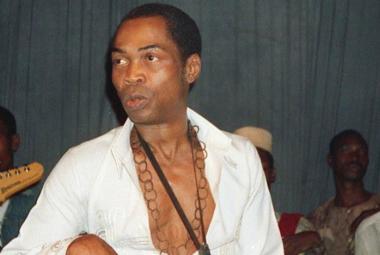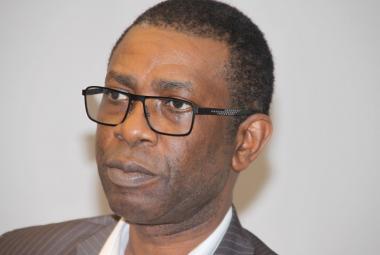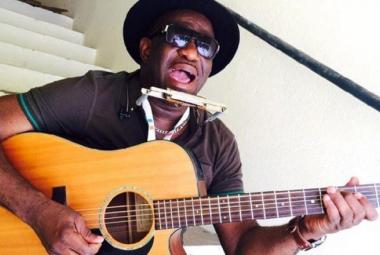Perpétue Dagbéto alias Dalina Pepe's is a Beninese singer who evolved for several years within the Poly Rythmo orchestra. She was the only woman in this legendary orchestra. She states that music is a matter of passion. She talks to us in this interview about her adventure with Poly Rythmo, her life and her musical career.
How can we introduce you today?
My name is Perpétue Dalina Dagbéto. I am a singer artist and my artist name is Dalina Pepe's. I did my school and university studies in Benin. I have a master's degree in human resource management. I worked at the town hall of Cotonou. I was a service manager for several years before I retired last year. Music and me is a matter of passion. Since I am now retired, I give myself the time and the strength to come back on stage very soon to please my fans.
What were your beginnings in music?
Since my childhood, I loved music, dancing and I brought joy to those around me. My late father, Robert Dagbéto, encouraged each child to do what he wanted as long as he did well in class. When we went on holiday to the village, our grandmother organized our stay correctly. There were groups to sing, to dance and also for storytelling. On our return to Cotonou, I liked to sing, dance and tell stories to my late father every evening. He really liked my demonstrations. In college, there were school cooperatives at the time. I had chosen music at the College of General Middle Education (CEMG) Sainte Rita in Cotonou. At first, my father was reluctant. It took the intervention of the general supervisor and the director of the college for him to accept my choice. But on one condition, that I bring him the best grades in class. I too respected his will until the end and he was very proud of me. My father came to attend my shows and to encourage me more, he offered me clothes to go on stage. In this establishment, there was also Nicodème Marie-Verger Fangbédji (Fanic) who, during recess, transformed the tables in the class into a battery and beat them at the top of their voices until they broke them all. Afterwards, I continued my schooling at the Coulibaly high school in Cotonou. In this establishment too, I joined the musical group where I interpreted songs by popular artists at the time. I found Fanic at Coulibaly high school. One day, my friend Lucie Eliane Adjovi, whose big sister was the wife of singer Vicky Aménoudji from the group Poly Rythmo, asked me to accompany her to just attend the orchestra rehearsals in the Djidjè district of Cotonou. I became more and more interested in the work of the group and they had started by accepting me to do the backing vocals during their rehearsals. I tried to work with them. When I made mistakes, the great guitarist Zoundégnon Bernard alias Papillon was always by my side to show me the techniques to follow. He gave me exercises and advice to improve myself. When they saw a de
sire on my part and an evolution in my performances, they integrated me into the group and I went on stage with them. I was still a very young girl between 17 and 18 years old still a student at the time. Since Poly Rythmo was the flagship group at the time, I had the chance to sing the choir of all the great foreign artists passing through Cotonou that the orchestra accompanied. So, very young, I knew all the artists who came to Benin and who were the pride of Africa and the world. I had become the only woman in the group. We played every Friday, Saturday and Sunday at Dédé at the Etoile rouge in Cotonou. At one point, the public demanded that I sing too. I took the microphone and I sang and people liked me a lot. The public encouraged me to continue in music.
What was the atmosphere within Poly Rythmo at the time?
It was a very nice atmosphere. There was brotherhood. The orchestra members were having fun, joking and teasing each other a lot. There was friendliness. They behaved as if there was no life other than that of the orchestra. When they met for rehearsals, there was always a bottle of Saint James Rum that everyone drank from the same glass to show solidarity in the group. Poly Rythmo is a band that I will never forget until the end of my days. Poly Rythmo allowed me to do a lot of scenes to the point that the music became fun for me. I went on stage at least three (03) times a week, which allowed me to know the public and to master it. The foreign artists who came gave me gifts because they were always satisfied with our performances.

head of the family of Poly Rythmo",
Dalina Pepe's.
Were there women in Poly Rhythm before you?
Yes, there were female artists in this group before me. I can cite for example Sena Joy Jelia, Cella Stella etc. But they didn't last in this group like me. I was the female singer who had spent a very long time with the Poly Rythmo orchestra. I was more united with the group and we had spent very long years of life as artists together. We had traveled for tours in Africa and Europe, particularly in France. When they celebrated the 50th anniversary of the orchestra the last time, they did not hesitate to invite me to accompany them. I will say that Poly Rythmo trained me on stage and strengthened me in music. The musicians were my fathers, my brothers and my friends. Poly Rythmo was a family. Unfortunately, many of them are no longer of this world. Peace to their souls.
What was your secret to staying with Poly Rythmo for a long time?
First there is education. Our parents always told us to respect and serve the elders to benefit from their knowledge. I did Poly Rythmo to learn music and they taught me music. I listened to their criticism and advice and used it to improve and move forward. This is the reason why I lasted with this orchestra. And then, this group allowed me to meet the great artists of the world and to work with them. This is a feat in my life. The members of the orchestra took me for their sister. They weren't frustrating me, rejecting me. My collaboration with them took place with respect and sincerity. Being the only woman among them, they took care of me so that I could stay among them. I pay tribute to Mèlomè Clément who behaved like a father. It was he who had come to see my dad to get his permission to join the orchestra and he had reassured my father. He fully supported me at all levels even when we were traveling to go abroad. At some point, the musicians no longer saw me as a woman, but rather as a boy and everything was fine between us.
What was the place of Zoundégnon Bernard alias Papillon in the orchestra?
If Poly Rythmo was a house, I would say Papillon would be the head of the family. Mèlomè Clément was the conductor, but the head of the family was Zoundégnon Bernard alias Papillon. He was the organizer of the group. He put rigor in everyone's work. He did not allow disorder when it came to work. He imposed himself through his work. He was a man of his word. Everything rhymed around him and everyone liked to listen to him. He was the base of the group and at the same time, he put himself above everything to better manage the orchestra. He did everything he could to create harmony and a good atmosphere within the group. He was simply a great man of exceptional nature. He made a positive impression on everyone.
What was really behind the downfall of the Almighty Poly Rhythmo?
The sudden disappearance of Zoundégnon Bernard alias Papillon had a lot to do with the fall of Poly Rythmo. His aura hovered enormously over everyone and he managed to hold each of the members of the orchestra. His hasty departure weakened the cohesion that existed within the elements of the group. Afterwards, there was also the death of drummer Léopold Yèhouessi. One of the reasons for the downfall of Poly Rythmo is also the woman. When it comes to women, everyone knew the musicians of Poly Rythmo. They loved it. At some point, distrust had begun to win over the group. Gossip and gossip created division and distance from each other. They were not wage earners and at one time the members lacked the resources to live on. The breach of contract with Albarika Store had also weakened the orchestra.

Dalina Pepe's.
Do you regret being a member of the Almighty Poly Rhythmo?
No way. On the contrary, it is an orchestra that musically formed, molded and raised me. I have benefited a lot from Poly Rhythmo. And then, we cannot quantify the service that Poly Rythmo has provided in Benin. It is huge and unimaginable. If I have to start over, I will. The orchestra was essential. People knew Benin in the world through Poly Rythmo. I do not regret it.
How have you been able to evolve in music without Poly Rhythmo until now?
It must be recognized that at university, I joined the group Les Kasseurs led in our time by Lazare Sèhoueto. I sang with Paul and Claire Ayémona, Eric Houndété, Antoine Dayori, Arifari Bako, Soumanou Toléba etc. I take advantage of this interview to have a pious thought for Cécilia Lalayè and Appolinaire Soglo who no longer live among us. So, I was no longer frequent in the Poly Rhythm. Nevertheless, when they had a big concert, they would call me and I would answer them. After my studies, there was marriage and the arrival of children, not to mention professional life. All this took me away from the scene. But I haven't given up musically. In 2001, I released an album entitled "La passion" in duet with Ayélo Castella and produced by Nel Oliver. It was a record that was a hit with the public and people were humming my song 'Signin Gangan'. He won a prize at Midem in France. I'm thinking of remixing this song very soon because music lovers keep asking for it. I salute Ayélo Castella and Nel Oliver for the quality of this work. After this wonderful experience, I released three (03) singles and a ten-track album dedicated to gospel to glorify the Lord. I always manage to get back into my funds when each work comes out. When I tour, the public welcomes me.
What future do you reserve today for your career?
My concern today is to get back on stage. I have a lot of pieces. I intend to work on them and go to the studio to release them. I am thinking of taking some of them back to adapt them to the style in vogue today. I want to follow up and not hang up.
What is your view on the state of Beninese music today as one of the elders?
It hurts my heart at times and joy also at times. I find this joy through certain artists who really know what they want and who really give themselves to work. In my opinion, music is an art that should serve to educate music lovers. The songs must convey messages of peace, love, education, in short, instructive messages. But all we find is that it's all about sound. We are only concerned with the sound and not with the message. Messages are dropped. The big problem too is that everyone wants to sing today. Before, the first comer approached the microphone. You first have to work for a long time in an orchestra and be ready before you start singing in front of an audience. Today, someone who doesn't know what he wants to do with his life, releases a single using a computer and he becomes a singer. If it is a girl, she dresses in an extravagant and shocking way and it is to expose her body because she has improvised herself as an artist. For me, it's a matter of education. The woman must embody the woman. She is a beautiful creature that God created, she must run after her dignity, her pride and respect herself to deserve the value she embodies. But there are some who are exceptions. But for the most part, they necessarily want to sing. In this case, we choose the path of moral excesses. There are behaviors that I do not appreciate in some of our young sister artists.
What do you have to say to end this interview?
Thank you for initiating this interview. My thanks also go to Mr. Lambert Awadjo who does not accept my silence vis-à-vis the scene. He keeps encouraging me to reconnect with music. I promise to come back very soon. You have to step back to jump better. It's a way to hide and come back strong. That's what I do. My greetings are also addressed to all the musicians and singers without forgetting the men of the media and the leaders of our country. Good luck to the music.
Interview by Jean-Discipline Adjomassokou
Source: https://letrafic.com
Trafic (COTONOU)




















